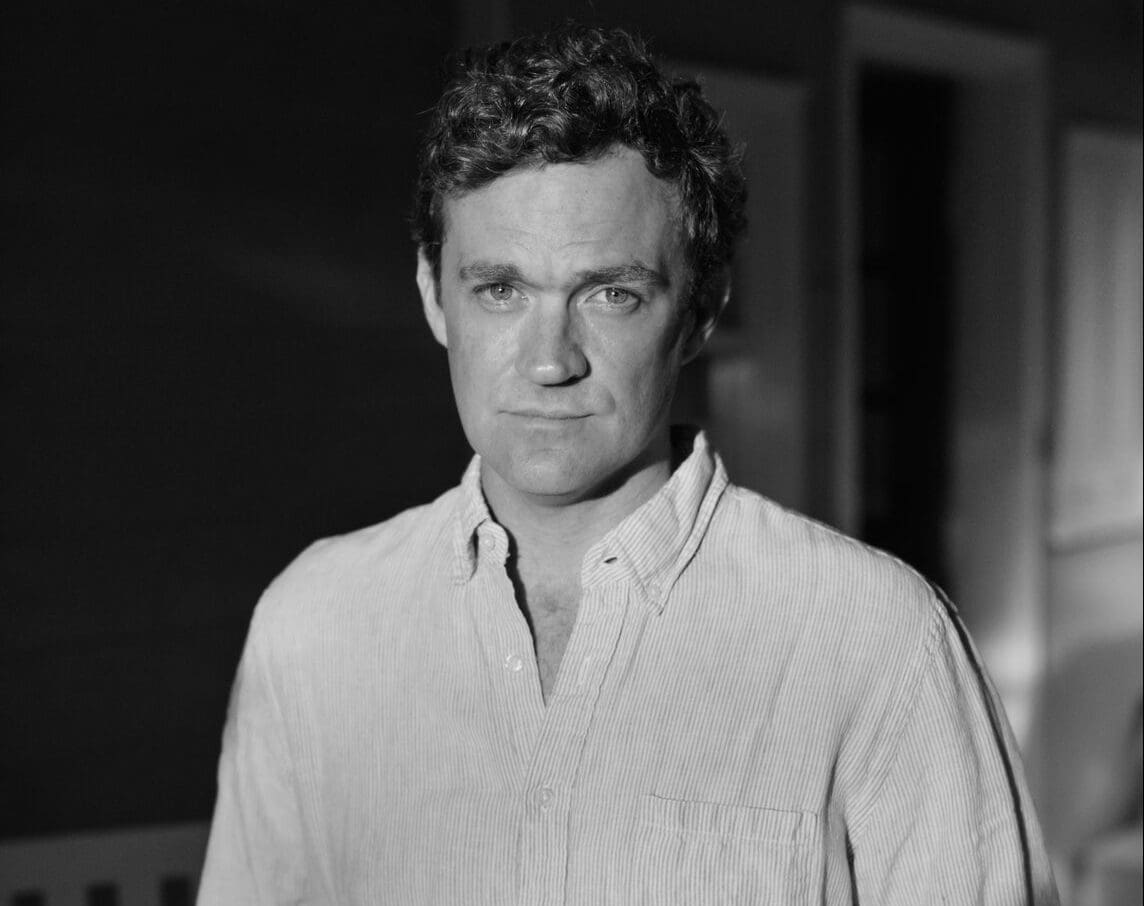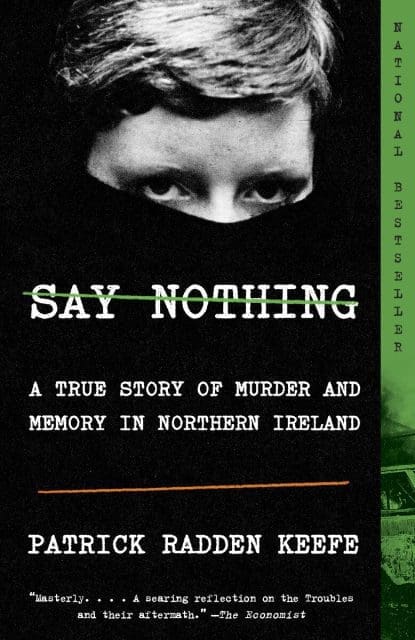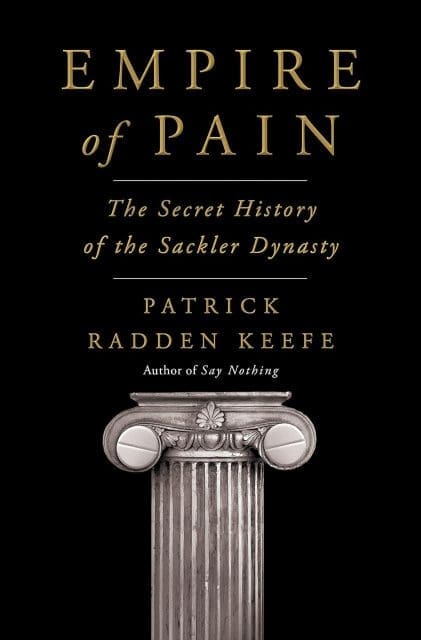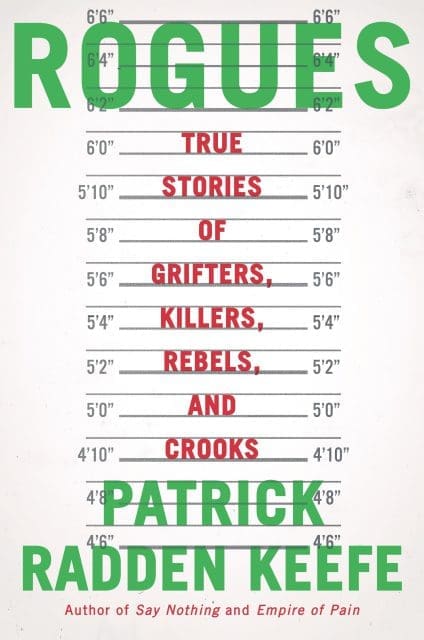
Patrick Radden Keefe is a New Yorker staff writer, investigative journalist and author of five books which delve into murky and enthralling areas ranging from cold case murders and miscarriages of justice to fraud, sectarianism and espionage. His work pinpoints the paradox of human enterprise mingled with moral decay. Still only in his forties, he has received a plethora of awards and two of his books are currently being adapted for television. With a forensic eye for detail, paired with a novelist’s gift for writing character and story, Keefe is an extraordinary talent. I was delighted to interview the great man for A RABBIT’S FOOT.
Genevieve Gaunt: In your latest book Rogues you write that your work reflects your ‘abiding preoccupations: crime and corruption, secrets and lies’. You examine how these often dubious characters are made. How was the writer Patrick Radden Keefe made?
Patrick Radden Keefe: I grew up in a house full of books. My mother was an academic philosopher and my father, who worked in state government, wrote too. When I was 12 they went off to the Caribbean to write respective mystery novels but neither found a publisher, so writing and its challenges were pretty proximate notions for me growing up. I stayed in school for a long, long time. I wanted to be a writer from early on but I couldn’t figure out how to make a living doing it. So I went to college [Columbia] and then got a master’s degree [Cambridge] and then I got another master’s degree [LSE] and then I went to law school [Yale]. My first book Chatter was published as I was finishing up at law school and I was starting to find work in magazines. But it took a long time for me to take the sort of fantasy ambition that I had at 15 years old and turn that into something that looked like real life.

GG: Has your legal nous helped with the work that you do?
PRK: Yes, it has. Law school was more of a happy accident—a very expensive happy accident. But yes, it has helped. I know my way around a court docket, I can talk with lawyers and I’m not overly intimidated when I get a legal threat. It’s legal ethics I find more interesting: the idea of lawyers as these highly skilled samurai for rent to the highest bidder was one that I always found morally complex and troubling. That’s a thread that runs through a lot of my work: the complexity of ethics and how people can work inside of the law whilst doing things that seem morally repugnant.
GG: Have you become disillusioned with the law as being more of a game to be played rather than an upholder of the truth?
PRK: I think that’s right to a degree and much truer now than it was when I graduated law school, 18 or so years ago. As in other areas of society such as education, healthcare, the list goes on… money is everything, and so it is in the legal system. That’s a truth that I’m confronted with all the time in my work regarding accountability and infractions. Who gets away with it? All those types of questions are very much informed by money and power at every level.
GG: In Say Nothing and Empire of Pain, you bring miscarriages of justice to light but in those tales, unlike in a mystery novel, justice itself has not quite been served. Do you think that it’s the lawyers who have the last laugh?
PRK: “The house always wins”. Yes, I do. If you have a company that’s bankrupt, there’s a finite amount of money to divvy up. Then all these lawyers come and say, “Well, let us help you, but we’re going to be the first ones to take our share before it goes to anyone else.”
GG: It’s very Bleak House: endless filings and court cases. How do you get access to confidential files?
PRK: I love documents and I love interviewing people and hearing their stories. In the case of Empire of Pain, it was tens of thousands of pages that I had to comb through and a lot of the time you’re just looking for details, these little gold threads. Sometimes you have to read a 500-page filing and what you get from it is one line, one image or one quote. One of the biggest dangers is the desire to shoehorn everything you’ve learned into the manuscript. In terms of getting the document, it’s by hook or by crook. Sometimes there are filings in the public domain but other people don’t necessarily get a hold of them. And then, sometimes people leak things to you. There are a series of documents and emails cited in Empire of Pain that insiders leaked to me and in a bizarre way. I live outside of New York City and one night, I came home and there was an envelope in my mailbox addressed to me but with no stamp and no postage; so somebody had figured out where I lived and dropped it in the mailbox. Inside was a little index card with a quote from The Great Gatsby about how “careless” Tom and Daisy were. And then, there was this thumb drive. This all happened during the pandemic and I was paranoid about the Sacklers so I bought a burner laptop for $300 just to plug this thing in. There were thousands of pages of documents on it. Many of them were legal documents. Somebody had wanted me to have these. But even then I was distressed. I work a lot from paper so I needed to print things out so I had to get a burner printer too!
GG: Lacunae sometimes signal an area of cover-up. Such as, in Empire of Pain, when you requested the emails of Curtis Wright and they came back as “lost or destroyed”. Can you say more about that?
PRK: I have a kind of childish counter-suggestibility in the sense that if you tell me there’s a room I’m not supposed to go into, all I want to do is to find some way to get into that room. In the case of Curtis Wright, he was a man who approved Purdue Pharma’s drug, OxyContin. He subsequently went to work for Purdue Pharma. I sued the FDA. I took them to court in order to get their internal documents and it was only at that point that they explained to me that his documents had all been lost or destroyed, which seemed very suspicious. The very absence of information is pretty telling.
GG: How do you approach the write-around, when the subject of an article or book refuses to be interviewed?
PRK: In the case of Mark Burnett, the reality TV producer who made The Apprentice and put Donald Trump on the national stage, he wouldn’t speak to me. But he had these two ex-wives who were great sources. If you gave me the choice between an interview with Burnett himself, somebody who’s very scripted and “on message”, and interviews with these two ex-wives, I would take the ex-wives any day. I try to get as close to the people I’m writing about as possible. I want to feel almost clammily intimate with them and the best way to do that is to find people who they’ve lived with, people who know them really well such as a roommate, a housekeeper, a yoga instructor; people who come into people’s lives and see the wealthy and the powerful in a vulnerable light the way the outside world never does.
GG: After you wrote about El Chapo, the drug baron, you revealed that you were approached by the family lawyer to write his memoir and you politely declined. Are there any profiles you wouldn’t go near? A subject you consider too dangerous?
PRK: With two young kids and a wife who I have a great relationship with, I wouldn’t cover a war. One of my parents’ best friends was a guy named Kurt Schork who became a war correspondent for Reuters. We would listen to his radio broadcasts from Sarajevo, the Balkans and Iraq around our kitchen table. Kurt ended up being killed in Sierra Leone some years later and I think that’s a little bit of a shadow in my family.
GG: Is there a person, living or dead, that you would most like to speak to?
PRK: I would have to say Arthur Sackler. I devoted the first third of Empire of Pain to him because I found him so fascinating. Honestly, some of the younger Sacklers I find a bit banal. You’d think I’d be dying to interview people like Gerry Adams but I actually think that they would be a really uninteresting interview because they’re robotic in their self-deception so the interview wouldn’t yield very much. But Arthur Sackler glided through the world and his con was so good that everybody believed that he was this morally upstanding father of medicine but really he was an advertising shill who hijacked the interaction between doctor and patient.

GG: Arthur Sackler in Empire of Pain and Sister Ping in The Snakehead (the Chinese grandmother who amassed a $40m fortune smuggling immigrants into New York) are both rags-to-riches antiheroes. Why are you drawn to these types of characters?
PRK: I’ve always been very interested in hustlers. I’m interested in people who start on the periphery and work their way into the heart of things. Often they do this in a way that cuts corners or flouts the law and they kind of fake it till they make it and often they make it in a spectacular fashion. I wrote a big profile in The New Yorker on Larry Gagosian and I think of him as very similar. Gagosian wasn’t an immigrant, he came from an Armenian family in Los Angeles but through sheer hustle and brio, he became the biggest art dealer in the history of the world.
GG: You handle the legal tightrope when writing about Larry Gagosian with deadly humour. When someone alleges that Gagosian had had too much to drink and shouted at his staff to play music you write in parentheses: ‘(Gagosian denies that he was drunk or requested Aerosmith.)’
PRK: [Laughs] We had fun with that. I’m intrigued by the type of person, like Gagosian, who by the sheer force of their charisma and personality, invent an industry where it didn’t exist before. That’s true for Gagosian, it’s true for Sister Ping, it’s true for Arthur Sackler with medical advertising.
GG: These tales have the American Dream in their DNA. Do they also speak more widely about human nature and corruption?
PRK: I do think that there is something peculiarly American about some of these stories. The three Sackler brothers were the children of poor immigrants, almost unable to afford school books, with parents who didn’t speak English in the home, living on the margins in Brooklyn and who within one generation had their name etched in stone across elite institutions. I think that’s a siren song for a lot of people. I’m very intrigued by the amoral and immoral moves that some of these people make along the way in order to achieve that kind of success.
GG: In your podcast, Wind of Change, inspired by a song name by German rock band Scorpions, you come up against the CIA’s generic and ambiguous response “We can neither confirm nor deny”. It made me think of the theme of ambiguity that runs through your work and how the truth can be opaque rather than transparent?
PRK: You’re absolutely right. On the surface, the Wind of Change podcast is about finding the answer to the question: did the CIA write the song Wind of Change? But on a deeper level it’s a little bit of a philosophical argument asking, as we move through the world and we’re confronted with conspiracies and constellations of evidence, is it better to try and find meaning even if you can’t be sure or is it better to content yourself with realising that we live in a world full of secrets and ambiguity that we may never fully know? My colleague, Gideon Lewis-Kraus wrote a wonderful piece about new findings on UFOs for The New Yorker in which there are two characters. One is a UFO sceptic who every time there was a photo of some object in the sky would write a long explanation for how it was actually just a little bit of dust that happened to catch the light in a certain way. The second character is a great UFO believer who goes to great lengths to say that these unidentified objects cannot be dismissed. Two people will see the same evidence in different ways.

GG: Like Wittgenstein’s duck/rabbit illusion…In the podcast you interview an ex-CIA agent who reveals that, contrary to popular belief, Hollywood sometimes influences the CIA rather than the other way around. Fiction inspires fact. Can you regale readers with the link between the CIA and Hollywood?
PRK: I’ve always been fascinated by this. I had a weird interlude in 2010 when I worked at the Pentagon for a year. I was given ‘Top Secret Clearance’, I put on a suit every day and went to the office of the Secretary of Defense. But when I got inside, it was a bureaucracy like any other—it was like the show The Office, and that always stuck with me. So when we got going on Wind of Change, I was just so intrigued to look at the whole history of the CIA cooperating with Hollywood, whether it’s getting Hollywood makeup designers to come in and help them with their disguises or the idea that in the early years, when the 1960’s TV show Mission Impossible was on, everybody at the CIA would watch it and say “God, those latex masks they use—we should really make those” Learning that people at the CIA have been listening to
My podcast Wind of Change is an indication of a similar kind of thing going on. Maybe they’re thinking now, “Gosh, we didn’t write Wind of Change, but it’s time we started writing pop songs. That’s a great idea.”
GG: The Oscar-garlanded production company A24 is adapting your book, The Snakehead. Can you reveal anything about the production?
PRK: Yes, I’m co-creating the show with a really fantastic writer named Anna Ouyang Moench who has been a writer on Severance.
GG: Your books examine the truth in all its complexity. Is there an inherent conflict having Hollywood, which is a story factory that sometimes bends the truth for dramatic purposes–adapt Say Nothing?
PRK: Say Nothing will come out in 2024 in 9 parts. I’m an executive producer on the show, not a writer but I wouldn’t have made a deal to make Say Nothing with just anyone. The producers, Nina Jacobson and Brad Simpson, are people I’ve known for years and I have a lot of trust and confidence in. I see my role as producer not as a cop exactly but as somebody who is always there, trying to keep it as real as possible, remembering that this is a story about real people, some of whom are still alive. Your North Star in these situations is to tell a story with real integrity, with compassion and to tell a version that you feel you can stand by. I listened to a podcast recently with Ian McEwan who said that when you write a novel you’re like God, you control every detail but when it’s a movie, you’re like a minor lieutenant colonel in this vast army and I think that’s true.
GG: Can you tell us what’s coming next?
PRK: I’m working on a piece now that’s set in London. That’s all I can say for now but it’s a really interesting story. I’m developing The Snakehead and working out what the next book will be.
Featured image: Patrick Radden Keefe by Philip Montgomery.



